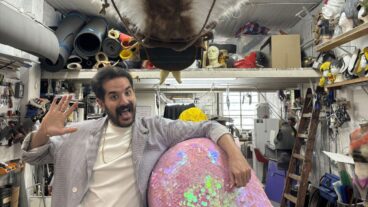Avishai Cohen, though primarily known as sideman to Chick Corea, is gradually building a reputation as a leader in his own right – his fifth album is due out this June.Over the years, Israelis have gained something of a reputation for making their presence felt wherever they roam.
But the impact Israeli musicians are having on the New York jazz scene is nothing short of remarkable.
When double bass player Avishai Cohen relocated from a village in the Jerusalem Hills to New York, in 1992, on the same plane as fellow Israelis bassist Omer Avital and trombonist Avi Lebovich, he had one clear goal in mind: to make it big in the epicenter of the jazz world.
Today, 11 years later, he has undeniably achieved that aim.
Cohen, though primarily known across the world as sideman to stellar pianist-keyboardist Chick Corea, is gradually building a reputation as a leader in his own right – his fifth album is due out this June.
He was in the vanguard of what eventually became something of a mini-invasion of Israeli jazzmen and jazzwomen seeking their fortune in the Land of Opportunity.
“Yes, we paved the way for the other guys to come over from Israel to New York,” says Cohen. “It wasn’t easy to being with. I did all sorts of odd jobs to make ends meet before I started getting regular gigs.”
Cohen?s observation that “it wasn’t easy” breaking into the New York jazz scene is an understatement in the extreme. Despite the fact that the Big Apple is one of the world’s great cultural melting pots with, seemingly, room for artists from all manner of backgrounds, surely a foreigner trying to compete with Americans at their very own jazz game is a classic case of taking hutzpah to the limit.
After all, what did a novice Israeli double bass player, fresh out of the army, have to offer a music community that had been home, or second home, to such untouchables as Duke Ellington, Miles Davis, Dizzie Gillespie and Benny Goodman?
Kim Smith, publicist of New York’s renowned Blue Note jazz club, feels Israeli musicians have the sort of streetwise-earned experience that makes them particularly accommodating and able to go with the flow, whatever their circumstances.
“The Israelis have a sort of “sababa” (laid-back) thing,” she says. “Very rarely do they complain or say negative things and I think this comes from growing up in a war torn country. As children, they have seen many things and have had to deal with issues we know nothing about here. They are taught to ‘eat’ life and never take anything for granted – this is ingrained and it comes out in the music.”
On his first album, Adama, Cohen laid his Middle Eastern cards out for all to see. In between the straightahead Corea-influenced jazz, Israeli Amos Hoffman’s oud (Arabic lute) wove a plaintive eastern cry that leaves the listener in no doubt where Cohen?s cultural roots lie.
“New York is a tough place but there is also an openness here which gives you the feeling you can create your own niche.”
Smith was suitably impressed with Cohen’s cross-cultural efforts, and those of his compatriots, and today believes Israeli artists are getting their cultural mix message across to American jazz musicians and fans alike.
“The instrumentation Avishai has used, especially in the beginning – with Amos Hoffman on oud – was a direct link to his heritage,” she says. “I think people relate to any music which comes from the heart – these sounds and rhythms are very real for these musicians and the honesty comes through. The thing I find interesting is the Israeli musicians’ capacity for interpreting ethnic music. Aside from their own, their knowledge of Middle Eastern/North African music, they also have a fondness for Latin music. You are very apt to see at least one Israeli playing in salsa orchestras or Cuban son groups and they are always very supportive.”
While Cohen plies his craft on the mainstream side of the jazz tracks, other New York based Israeli artists, such as reedmen Ori Kaplan and Assif Tsahar, earn their keep in more alternative ways.
Kaplan moved to New York around the same time as Cohen and immediately headed for the city’s avant-garde oriented venues, such as The Knitting Factory where he is now a regular feature. Besides the obvious benefits of working in the hub of global jazz activity, Kaplan feels he has also benefited simply from relocating to a different cultural milieu, and gaining life experience there.
“I’ve been here for 11 years now. Mostly I have realized things that can only be understood with the years – a transformation that no one can foresee unless lived, yet one which seems obvious in hindsight, and thousands of people go through it in plenty of new lands.”
Perhaps, though, the physical transition from Israel to the Big Apple doesn’t require too much social-cultural acclimatization. “Israelis mix very easily in New York,” says Kaplan. “There’s this nervous energy here that is familiar from home.”
Like Cohen, Kaplan also believes he has brought some added ethnic and artistic value to his new city. “I think I brought my own cultural baggage to the New York music scene – a bit of North African, Arabic and other Middle Eastern stuff. I feel I have found my place in the music scene here and am going through constant positive changes. I like that.”
With other Israelis, like former Herbie Hancock band member saxophonist Eli Dejibri, trumpeter Avishai E. Cohen and pianist Anat Fort continuing to make waves in the Big Apple, it has become clear that musicians from the Land of Milk and Honey have found their place and voice in the New York jazz community.
“Israelis have made a huge impact on the New York jazz scene,” says Smith. “They work very hard at their craft and are sometime relentless in the pursuit of music. They are open to everything.”












